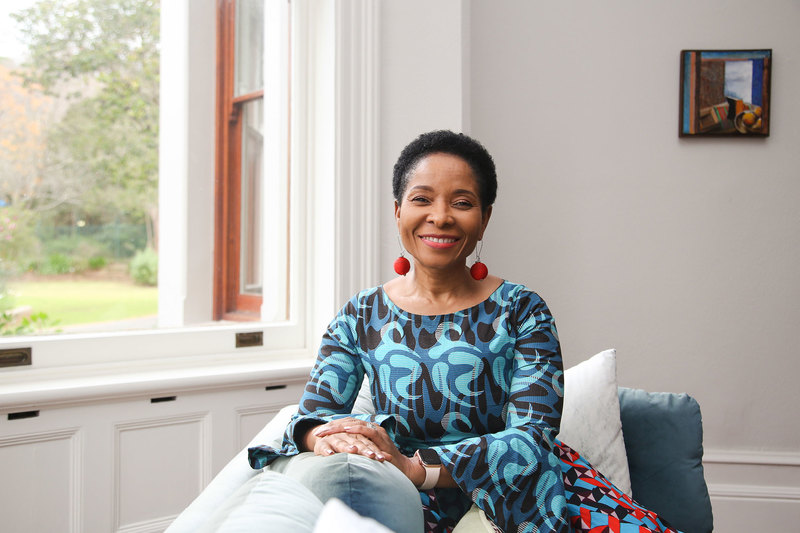UCT VC becomes inaugural Illustrious Visiting Professor at Bristol
26 October 2021 | Story Nicole Forrest. Photo Je’nine May. Read time 6 min.
On Wednesday, 20 October, University of Cape Town (UCT) Vice-Chancellor Professor Mamokgethi Phakeng spoke alongside professors Hugh Brady and Judith Squires of the University of Bristol (Bristol) at the launch of her illustrious visiting professorship.
The illustrious professorship is aimed at bringing eminent global research leaders to Bristol to engage with the academic community and executive leadership team to identify and develop opportunities for collaborative research, strategic partnerships and mutual learning.
Over the next 12 months, Professor Phakeng will engage with the academic community in various ways, including participating in a series of public lectures that will be recorded and shared online.
The hope is to learn from and be inspired by Phakeng’s knowledge, approaches and ethos, especially as they pertain to mathematics education. The university is also keen to develop a broader institutional partnership with UCT.
“The University of Bristol is delighted and honoured to welcome Professor Mamokgethi Phakeng as our first Bristol Illustrious Visiting Professor.”
Professor Brady, Bristol’s vice-chancellor, echoed this sentiment. “The University of Bristol is delighted and honoured to welcome Professor Mamokgethi Phakeng as our first Bristol Illustrious Visiting Professor. She has established herself as an inspirational figure in maths education and university leadership in South Africa.
“I have already had the great pleasure of working closely with Professor Phakeng on our important Bristol–UCT Strategic Partnership, and as members of the Worldwide Universities Network. It will be exciting to have our entire community benefit from Professor Phakeng’s expertise, energy and vision over the year ahead,” he said.
A great honour and opportunity
Throughout her career, Phakeng has broken new ground as the first woman in a range of prestigious positions, and the visiting professorship is sure to build upon these. Commenting on the opportunities that the illustrious professorship will bring, Phakeng noted that she believes the partnership will be fruitful for all parties involved.
“Being appointed as the first Illustrious Visiting Professor at [Bristol] is a great honour, not only for me on a personal level, but also for African scholarship. It’s an opportunity to share from the work that I have done in multilingual mathematics classrooms in South Africa.
“The landscape of education around the world – and more specifically, the landscape of leadership in higher education – has changed a great deal in recent years, and will change even more in the future. I hope this new relationship will offer opportunities to share with my colleagues in Bristol from my own leadership journey. And I am excited to learn from them in turn.
“I have found important parallels between our two cities, our respective campuses, and the countries we represent.”
“On a much wider scale, I believe this appointment will also strengthen the relationship between two great institutions of higher learning: UCT, which is the highest-ranked university in Africa, and [Bristol], which ranks among the world’s top 60 institutions of research and higher education,” she noted.
Bridging cultural and historical divides
While there may be many differences between Bristol and UCT, Phakeng highlighted several factors that bind the institutions to each other and promise to make for a rewarding relationship.
“As the crow flies, the distance between Bristol and Cape Town is about 9 712 km. People might say that difference is even greater in terms of culture, history and demographics; but I have found important parallels between our two cities, our respective campuses, and the countries we represent,” she explained.
“These parallels illustrate the importance of a university to each neighbouring community and nation for casting off the old image of an ivory tower. The 21st-century university is part of the lifeblood of society. We need to be accountable to our communities. Academics need to make a difference in people’s lives. And we need to inspire our graduates to make a difference in the communities in which they live and work after their studies.
“We can explore how our two institutions can strengthen this work and develop shared capacity across the divide.”
“I trust that my role in Bristol’s life over the next year will cement our relationship and plant the seeds for further collaboration between our two institutions; that between us, we can build a bridge of academic-level cooperation and progress that will save both our continents, for many years to come.”
This, Phakeng hopes, will not only see a sharing of expertise across the two institutions, but also create a sense of fraternity in bridging longstanding divides.
“UCT and Bristol are both engaged in bridging cultural and [historical] divides. My hope is that in the next 12 months of illustrious visiting professorship, we can explore how our two institutions can strengthen this work and develop shared capacity across the divide.
“I hope that my appointment as Illustrious Visiting Professor will contribute to unity between our two institutions, despite the great physical distance between our campuses; that we will create a sense of global community that will help to influence other great institutions around the world. And that through our relationship, we will communicate the truth that knowledge belongs to everybody to save all human beings and our planet,” she concluded.
 This work is licensed under a Creative Commons Attribution-NoDerivatives 4.0 International License.
This work is licensed under a Creative Commons Attribution-NoDerivatives 4.0 International License.
Please view the republishing articles page for more information.










